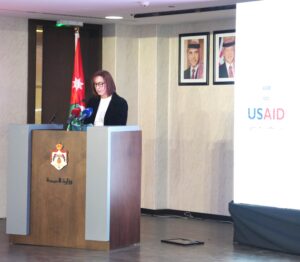Supporting Infection Prevention and Control Practices (IPC) in Dental Clinics: A Key Step in Combating Antimicrobial Resistance (AMR) in Jordan
Through funding from the USAID/Jordan Mission, the Medicines, Technologies, and Pharmaceutical Services (MTaPS) Program has been supporting the Ministry of Health (MOH) to implement key measures outlined in Jordan’s National Action Plan to Combat AMR. These include the reduction of infection rates through preventive measures, infection control, and general hygiene. Throughout 2023 and 2024, MTaPS provided the MOH with comprehensive technical and logistical support to conduct a nationwide IPC assessment in both public and private dental clinics.
Tailoring the assessment tool for Jordan’s context
To ensure the assessment was relevant to the local context, MTaPS supported the MOH’s IPC Department to adapt and customize the US Centers for Disease Control and Prevention’s (CDC) IPC assessment tool for use in dental clinics in Jordan. This effort laid the foundation for a detailed and customized evaluation across the country.
Nationwide assessment of dental clinics
MTaPS, in partnership with the MOH, developed a comprehensive plan to assess a sample of 600 dental clinics and centers across Jordan, covering both the public and private sectors. With a carefully drafted IPC assessment protocol, approved by the MOH’s Institutional Review Board (IRB), the assessment was carried out nationwide. Following the assessment, a detailed report was developed, highlighting key findings, challenges, and recommendations for improving infection control standards in dental settings. This report has been essential in supporting the Ministry’s efforts to monitor and improve infection control practices in both private and public dental clinics, as well as primary health care (PHC) facilities across Jordan.
Dissemination event to launch findings
On January 5th, 2024, MTaPS and the MOH, represented by the Epidemics Administration, the Primary Health Care Administration, the Communicable Diseases Directorate, the Infection Prevention Department, the Dental Directorate, and the Jordan Dental Association, hosted a special event under the patronage of His Excellency the Minister of Health to share the results and recommendations from the assessment. The event brought together key stakeholders to discuss the results from the assessment and the next steps to improve IPC in specific dental and general PHC settings.

Representatives from various MOH Directorates and USAID at the National Infection Prevention and Control Practices Assessment Report Dissemination Event for Public and Private Dental Settings, January 5, 2025, at the MOH – Amman, Jordan. Photo Credit: MTaPS Jordan.

Dr. Raed Al-Shboul, Secretary General for Primary Health Care and Epidemics, provides opening remarks about the assessment, January 5, 2025, at the MOH – Amman, Jordan. Photo Credit: MTaPS Jordan.
Drafting national IPC policies for PHC facilities
Based on the preliminary assessment results, MTaPS is now working with the MOH’s IPC Department and the IPC Technical Committee—commissioned by the Minister of Health—to develop the National Infection Prevention and Control Policies and Procedures Manual for PHC facilities. The committee drafting the manual is led by Dr. Mohammad Al-Hawarat, Director of the Communicable Diseases Directorate, and comprises 20 representatives from various fields in PHC and infection control.
Improving healthcare safety
These initiatives represent a significant step towards enhancing the quality of healthcare services and patient safety in both public and private PHC facilities across Jordan. By strengthening IPC practices, the program aims to reduce the spread of infections and, ultimately, combat AMR in the country.
His Excellency Dr. Raed Al-Shboul, the Secretary General for Primary Health Care and Epidemics at the MOH, emphasized the importance of infection prevention measures for sustaining the health system and tackling growing health challenges. He added, “The Ministry of Health is proud of its role in strengthening infection prevention measures through collaboration with private health institutions. This partnership is crucial for achieving national goals and addressing challenges like antimicrobial resistance. A heartfelt thanks to USAID and the MTaPS program for their support and valuable contributions to completing this assessment and to the health experts and practitioners who participated in this national effort.”

Ms. Bethany Haberer, Director of the Population and Family Health Office at USAID Jordan Mission support, provides opening remarks about the USAID support and partnership with the MOH, January 5, 2025, at the MOH – Amman, Jordan. Photo Credit: MTaPS Jordan.
“IPC is the cornerstone of safe and effective health care,” said USAID Population and Family Health Office Director Bethany Haberer. “It protects both patients and health-care providers.” She highlighted the importance of the partnership between the Ministry of Health and the Agency in enhancing and improving public health in Jordan.